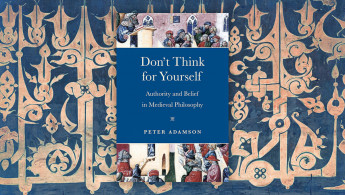Don't Think for Yourself: Questioning authority and belief in medieval philosophy
Can medieval debates on authority and expertise help us with our arguments over expertise today? Don’t Think for Yourself: Authority and Belief in Medieval Philosophy by Peter Adamson wants us to consider this possibility.
The last few years of Brexit, Trump, fake news, Covid-19 and other events have forced many to question the role of experts in society and when to listen to them and when to ignore them.
While our contemporary debates are particular to us, arguments over expertise have raged throughout the ages. While many incorrectly assume the medieval world has little to teach us, Don’t Think for Yourself delves into the sometimes surprising debates from the past, which feel like echoes of our own times.
“Medieval philosophers engaged in explicit and productive reflection on this very question of when, and how, one might responsibly form one’s beliefs based on authority.”
"Don’t Think for Yourself is a timely intervention from the past into the present. And while it is up to the individual reader to decide who they think offers the best insight today, Peter Adamson offers us a chance to have a dialogue across the generations, cultures and geographies"
Looking at Christian, Islamic and Jewish thinkers in the Middle East and Europe, Adamson challenges us on two levels.
Firstly Adamson considers medieval philosophy in our contemporary debates and secondly, he thinks of the Middle Ages in global terms. As Adamson points out, the line between different religions and communities is often blurred and philosophers from different communities interacted, debated and were influenced by one another. Diversity is not a new thing.
Under what conditions should people follow their own independent reason or follow the advice of an authority figure? The problem of Taqlid [imitation] vs ijtihad [independent effort] was a core debate among medieval philosophers, theologians and legal scholars.
|
It’s important to outline here that there was no universally accepted answer to these questions, which Don’t Think for Yourself very clearly demonstrates.
There is no Islamic, Christian or Jewish position on this, rather there are different responses from Muslims, Christians and Jews, which strongly interact with each other.
Taqlid, which has the meaning of both tradition and following the opinions of an authority figure, was a source of lively contention.
In particular, to what extent can Taqlid be relied upon, if at all, and what qualifications should be applied to it? The issues grappled with here mirror our contemporary debates around Covid-19, the problem of public knowledge and what ought to be done about it.
One group of Muslim jurists, the Asharties, were deeply sceptical about Taqlid, partly due to the fact it exposes the average believer to something called epistemic luck or “believers whose convictions are formed by taqlid will only be right if they happen to follow reliable authority”: by blinding accepting a particular specific school or scholar, right and wrong is down to chance.
Another contention if someone forms a belief solely obtained through blind acceptance to a school, it leaves them ill-prepared for dealing with doubt and could cause a loss of belief. One Asharite theologian argues, “to accept taqlid is wrong and that one must carry out proofs and demonstrations.”
This does not mean Asharites believed ordinary people needed to decide all matters on their own, as Adamson shows, Al-Juwayni (d. 1085) worried demanding full-blown rational inquiry from them on every matter was asking too much. Moroccan scholar Muhammad Ibn Yusuf Al-Sansui (d. 1490) had a blanket ban on Taqlid, but other scholars believed Taqlid should exist in some form.
|
Al-Ghazali (d. 1111) went further and believed independent inquiry should only exist for a select few and total Taqlid should exist for the rest. But even here Al-Ghazali’s view has more layers to it, “still think for ourselves,” Adamson writes, “by thinking about which authority is worth believing.”
As Adamson qualifies, Al-Ghazali puts forward a kind of epistemic bootstrapping, “in which we submit to an authority in some domain but only after understanding the domain well enough to satisfy ourselves that these authority figures have genuine expertise.”
Don’t Think for Yourself is a timely intervention from the past into the present. And while it is up to the individual reader to decide who they think offers the best insight today, Peter Adamson offers us a chance to have a dialogue across the generations, cultures and geographies.
The lively debates in the pre-modern world should destabilise any arguments that present past societies as intellectually homogeneous, driven by irrational beliefs and lacking complex and nuanced thinkers.
We may not agree with what our predecessors thought about expertise and our relationship to it, but reading them might trigger a new way of thinking about our problems. A thoughtful, engaging and erudite book that leaves one wanting more.
Usman Butt is a multimedia television researcher, filmmaker and writer based in London. Usman read International Relations and Arabic Language at the University of Westminster and completed a Master of Arts in Palestine Studies at the University of Exeter.
Follow him on Twitter: @TheUsmanButt



